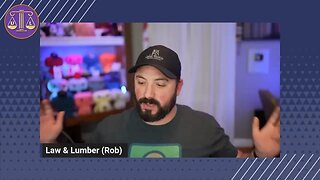Premium Only Content

Reverse Location Search Warrants - Google Location Dragnet
Over the last couple of years, there’s been a rise in the use of reverse location search warrants by law enforcement. These controversial warrants force Google to hand over data on users who were close to the scene of a crime, even if they’re innocent.
Now a new report from The Verge has shown that this type of warrant was used once again by law enforcement officials in Wisconsin while investigating a bank robbery in November 2018. The reverse search warrant, in this case, ordered Google to hand over data from Google users who were within 100 feet of the bank during a 30-minute window to help the police identify three suspects – two men who robbed the bank and a driver who dropped off and picked up these suspects.
It’s unclear whether the use of this reverse location search warrant helped to identify the bank robbery suspects, with officers telling The Verge that the case is still ongoing and that they cannot provide any further information.
Civil liberties groups such as the Electronic Frontier Foundation (EFF) have been very critical of these types of warrants for the following reasons:
The warrants often result in the data from hundreds of innocent people being collected by law enforcement which could be a violation of the Fourth Amendment and implicate innocent people. If the perpetrators don’t carry phones or other devices with location-tracking services, the problem is compounded and these warrants result in all the data collected coming from innocent people.
If law enforcement officials narrow the scope of their request to fewer devices, they can often obtain more detailed data which includes the person’s movements outside of the original requested area and time period.
It’s questionable whether these warrants truly establish probable cause.
When responding to reverse location search warrants, Google uses the location data collected through its various services to determine which users were close to the scene of a crime. However, it’s unclear which types of location data are used to make this determination.
Earlier this year, The New York Times reported that Google was using a database called Sensorvault to serve these requests. The Sensorvault database is connected to a Google service called “Location History” which is turned off by default. Google users are encouraged to turn “Location History” on when using certain apps (such as Google Maps) and features (such as location tagging in Google Photos).
Once it’s turned on, Google will collect location data and send it to Sensorvault as long as users are signed in to their accounts and have location-enabled Google apps on their phone. With certain phone settings, this location data will be collected even when the apps aren’t in use.
However, even when Google users turn off “Location History,” Google still collects location-based data from some of its apps and services. For example, Google takes a snapshot of a user’s location when they open Google Maps and often saves a user’s location when they use Google Search. This location-based data collection is enabled by default and can only be turned off by pausing “Web and App Activity” in the “My Activity” section of a Google account.
While The New York Times claims that only Sensorvault data is provided to law enforcement when a reverse location search warrant is served, The Verge has reported that this Wisconsin bank robbery warrant scooped up data from “every Android phone” and “any Google user” who had been within 100 feet of the bank during the 30 minute window.
This is the second time this month that reports have shown these reverse location search warrants being used to collect data from innocent people. The previous incident involved law enforcement officials in New York using this type of warrant to identify four protestors who were believed to be associated with the left-wing activist group Antifa after they were allegedly assaulted by the men’s organization the Proud Boys. The warrant sought data from Android and Google users who were close to the alleged assault.
Other reports have shown that at least 22 reverse location search warrants have been used in Minnesota since August 2018 and there are many other examples of these warrants being used across the US.
Thanks for watching our videos, Like them, comment your suggestions, share with your friends & don't forget to subscribe and click on the bell Icon, So you never miss any update from us.
-
 5:48
5:48
UncivilLaw
1 year ago@RunkleOfTheBailey and I slowly torture @LawLumber (stream excerpt)
662 -
 56:00
56:00
Julie Green Ministries
2 hours agoTHE REAL REASON PRESIDENT TRUMP NEVER CONCEDED THE 2020 ELECTION
28K102 -
 1:30:18
1:30:18
Game On!
17 hours ago $2.77 earned2025 Sports Equinox Did NOT Disappoint!
8.45K1 -
 7:02
7:02
Adam Does Movies
18 hours ago $4.79 earnedIT: Welcome To Derry Episode 1 - Review
24.7K3 -
 9:05
9:05
Millionaire Mentor
16 hours agoTrump EXPOSES Obama and Biden LIVE As Jim Jordan Backs Him Up
13.1K8 -
 1:34
1:34
WildCreatures
1 day ago $4.17 earnedMajestic Spotted Eagle Rays Fly Past Scuba Diver in the Galapagos Islands
10.8K8 -
 2:05:15
2:05:15
BEK TV
23 hours agoTrent Loos in the Morning - 10/28/2025
13.5K2 -
 32:13
32:13
Stephen Gardner
14 hours ago🔥Schumer SHUTDOWN Backfires as Trump CRUSHES Democrats!!
56.8K25 -
 30:24
30:24
Liberty Hangout
7 days agoNo Kings Protestors Go CRAZY: Part 1
53.9K81 -
 42:08
42:08
The Why Files
2 days agoLincoln Conspiracy: a Diary, a Mummy and The Escape of John Wilkes Booth
36.1K32